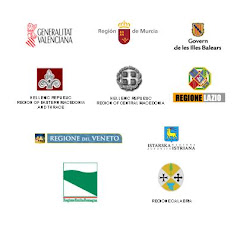1. We treat water as our common heritage with an economic, social, environmental and cultural value for our societies. Water is not a commodity like any other one – it’s a fragile resource which can not be replaced and we protect and preserve it for future generations to sustain our societies, our economies and the environment. Water sustainability is crucial for us.
Welcome to Wateregio blog!
Be aware of the latest news, events and ongoing projects.
Tuesday, November 25, 2008
2. Universal access to water and good state of ecosystems
2. Water is an essential human need and we recognize the access to basic water supply and sanitation as a human right. The people in Europe have universal access to safe, effective and affordable water and sanitation services. At the same time we are able to satisfy the other human water needs – for businesses, industry, agriculture and recreation and have achieved a balance with needs of the environment also with regard to sustain biodiversity. We can rely on essential ecosystem services from our healthy rivers, lakes, coastal waters and wetlands and our people can also enjoy high quality rivers, lakes and coastal waters for ecologic and recreational purposes.
3. River basin management
3. We manage our water resources sustainable within river basins across political boundaries including transboundary waters and we apply an integrated adaptive water management approach. All the stakeholders including all inhabitants in the basin participate actively in the management decision process. We apply a preventive approach, which integrates quality and quantity as well as surface water, groundwater and coastal waters. We have adopted and implemented ambitious legislation such as the Water Framework Directive and other related legislation and made other policy areas such as agriculture, regional, industrial, trade, transport and energy policy ´water sensitive´.
4. Public participation in water
4. We have achieved a true ´water democracy´ where we apply the principles of transparency, integrity, solidarity and equity and where all people and stakeholders are aware of their rights and responsibilities. Our well informed people use their freedom of choice wisely - what they drink and how they use water - and use their opportunity to participate actively in the governance of water management and services. The people have a say in the quality and organization of their services and our services are efficient and sensitive to environmental and social needs.
5. Integrate supply and demand
5. We have jointly achieved a culture where water resources are not wasted, spoiled or overused. We have actively pushed a paradigm shift from supply driven water management to an integrated supply and demand driven approach as well as from an end of pipe to a preventive approach. We are able to satisfy most of our needs with water resources within the same river basin.
6. Culture of water saving & water footprint
6. We have achieved a change of mindset, attitude and practices through raising water awareness and the application of appropriate instruments and incentives. Proven sustainable water practices, pricing and charging policies, transparency about water footprints of individual, industrial, agricultural and local authorities’ practices and of products have been useful instruments in achieving a modern water efficient society.
7. Price of water
7. Water services have a price. We pay for services and for the uses and our pricing policies are guided by transparency, sustainability, efficiency as well as a social and environmental approach. We use water pricing and other economic instruments to achieve sustainable water use.
8. Climate change, floods and droughts
8. We are coping with the challenges of climate change and with natural phenomena such as floods and droughts as we are continuously improving our adaptive, integrated management approach and we adapted our infrastructure and practices. Our infrastructure is planned, constructed, operated and maintained in an efficient and environmental and social acceptable manner based on a long-term perspective.
9. Water technology and irrigation systems
9. We apply appropriate technologies and have thereby continuously improved our water efficiency and minimized pollution to a level which is negligible with regard to human and environmental health. Communities, agriculture and industry enjoy the economic and social benefits of a high level of water productivity by applying recycling technologies, closed production cycles and efficient irrigation techniques and other technologies. We promote and conduct research and development to continuously improve our know how on adaptive integrated management and innovative technological solutions and have achieved a fast track to bring those technologies to the markets.
10. Water and development
10. Europe is a responsible partner in the world that actively promotes and supports the achievement of sustainable water management and universal access to water supply and sanitation in all countries. We have understood that sustainable water management is key to peace and security and to eradicate poverty and have made water a priority of our foreign and development policy. Our trade and economic policies have integrated water issues and we have significantly reduced our global water footprint to a level that is sustainable.
Subscribe to:
Posts (Atom)






